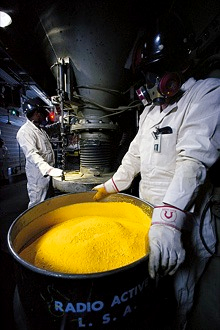
Uranium mines threaten African people and nature
Uranium exploitation leads to large-scale radiological and toxic contamination around many mining sites in Africa. Multinational mining companies remain largely unregulated and unaccountable, public participation in decision making regarding uranium mining is minimal, and long-term effects are insufficiently addressed.
Over the past year, the World Information Service on Energy (WISE) has conducted research in South Africa, Namibia, and the Central African Republic and has compared the situation in those countries with conditions in Canada and Australia, both of which are historically important uranium producing countries. The research involved extensive interviews with representatives of African governments, civil society, and five uranium mining companies: France-based AREVA, South African AngloGold Ashanti, English-Australian Rio Tinto, Australian Paladin, and Canadian First Uranium
The rising demand for uranium to produce nuclear energy has led to an increase of uranium mining activities in Africa in recent years. In countries such as Niger, Namibia, South Africa, the Central African Republic, Malawi, and Tanzania, companies have expanded their mines or are opening new mines.
Uranium mining is associated with high environmental impacts and human health risks. The costs of rehabilitation of the mining area are often many times higher than the total revenues derived during the mine’s entire lifetime. Nevertheless, uranium mining operations are welcomed in many African countries due to the short-term economic benefits they provide.
The report describes how multinational uranium mining companies are generally not held accountable for their social and environmental performance at African operations, and how governments and populations are struggling with a lack of knowledge and means to exert influence over companies and to address irresponsible corporate behaviour. Public participation in decision making is minimal and protection of human rights is insufficient. Radioactive and toxic contamination of water, land, and air is often not effectively addressed.
The social and environmental conditions at uranium mines is an increasingly relevant issue given mounting pressure on electricity companies to take responsibility for the conditions in the commodity chains that supply fuel for generating electricity.
Fleur Scheele, researcher at WISE and author of the report: “The serious problems associated with uranium mines in Africa raise doubts about the genuineness of electricity companies’ commitment to supply chain responsibility.”
The report was carried out as part of a larger SOMO/WISE project on uranium mining in Africa that included the February 2011 publication below.
-
Radioactive-Revenues (pdf, 738.77 KB)
Related news
-
 CSDDD Datahub reveals law covers fewer than 3,400 EU-based corporate groupsPosted in category:News
CSDDD Datahub reveals law covers fewer than 3,400 EU-based corporate groupsPosted in category:News David Ollivier de LethPublished on:
David Ollivier de LethPublished on: -
 Additional evidence filed against Booking.com for profiting from illegal settlementsPosted in category:News
Additional evidence filed against Booking.com for profiting from illegal settlementsPosted in category:News Lydia de LeeuwPublished on:
Lydia de LeeuwPublished on: -
 The hidden human costs linked to global supply chains in ChinaPosted in category:News
The hidden human costs linked to global supply chains in ChinaPosted in category:News Joshua RosenzweigPublished on:
Joshua RosenzweigPublished on:

